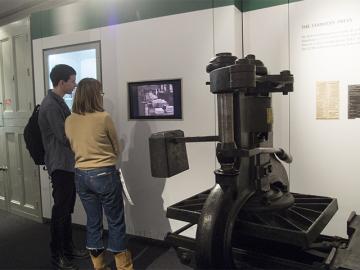Oxford University Press Museum

‘We are going to the Oxford University Press Museum’: to what will it be devoted? To the history of book printing? To notable titles issued by OUP? To fine specimens of the art of pressing (flower presses, clothes presses, impressment gangs)? Though a preserved and fully operational impressment gang would have provided a more holistic learning experience than one typically sees in our modern museums, I am pleased to continue drawing my stipend from the Ertegun Programme and not the Royal Navy. I cannot yet write a washing-bill in Babylonic cuneiform; I am not ready for the higher things.
Some items (non-Babylonic) that impressed me:
- Charles Butler: The Feminine Monarchie, Or the Historie of Bees: Shewing Their Admirable Nature, and Properties, Their Generation, and Colonies, Their Government, Loyaltie, Art, Industrie, Enemies, Warres, Magnanimitie, &c. Together with the Right Ordering of Them from Time to Time: and the Sweet Profit Arising Thereof. A wall detailing the history of the Press shows on a page from this book a sort of hymn to the queen bee, written by Butler with musical notation meant to evoke the droning of a hive. It turns out that prior to this Europe had been using Aristotle as its definitive source on bees: and Aristotle thinks bees are ruled by males, though he acknowledges controversy, some persons believing bees to be generated by females (Historia Animalium 5.XXI, 553b). Butler managed through observation to reach the conclusion that bees’ monarchie was in fact feminine, and his work of 1609 was confirmed sixty years later by Dutch biologist Jan Swammerdam. I am brought to admiration of seventeenth-century title conventions: if they were reintroduced authors’ purposes and publishers’ bottom lines would be served by cutting out the blurb-writers. No longer will the twist be revealed on the back, no longer will wrong information be urged on the prospective reader. Just compose a subtitle cataloguing your book’s entire contents.
- Edward Hyde, first Earl of Clarendon: History of the Rebellion and Civil Wars in England, Begun in the Year 1641. Printed in Oxford ‘at the Theatre’ (on which more presently). Rhodri helped me understand that the title page declaration, κτῆμα ἐς ἀεί (‘a possession for all time’, which is Thucydides’ description of his own work, History of the Peloponnesian War 1.22), rather than being simply an historian’s vaunt, placed Hyde within contemporary political dialogue. His own royalist view of history is that which ought to be maintained for aye, nay more, which shall be. The second epigraph, ne quid falsi dicere audeat, ne quid veri non audeat (‘may he dare to say nothing false, may he not dare to refrain from speaking truth’), is apparently just a quote from Cicero.
- The press at Oxford originally operated from the Sheldonian Theatre and had printing of the Authorised Version as a special focus. Printing books on the floor of a performance space is the sort of fantastic vivid combination of elements that makes the early modern period so compelling. I’ll have to see if I can find a way to incorporate it into a book (which could precipitate the decision as to whether, in the society of the novel I’m working on, they have printed books).
- Massive single-sheet Oxford Almanacks: still published, as it happens. This year’s features Corpus Christi College. I learned from the very first Oxford Almanack that the Church of England used to have set liturgical days upon which it was impermissible to contract a marriage – latter-day nefasti, it seems to me. Further evidence that the Isle of Britain came eventually to play host to the Spirit of Rome (though I think since then the British and the Americans have divided the Roman values and attitudes between themselves, and it’s the United States that is the current Third Rome).
- ‘An Appeal to the English-Speaking and English-Reading Public’: the creation of the OED was facilitated by waves of calls for volunteer readers to build the lists of word attestations. The lists of desiderata are of course heartwarming: ‘find us, please, a quotation containing the word haecceity from before 1647’ sounds like a wonderful treasure hunt. What a job, in the ages before searchable databases: to sit and read all day, seeking ultimately just a few choice words. If it had only been paid, how happily would I have made it my career – but then being a classicist is not so dissimilar. Anyway crowd-sourcing isn’t new. See also: the book of Esther, ‘everyone help me find a better wife’ (turning the nation into your personal dating agency).
- Tolkien’s OED slip for walnut. Such an exciting thing to see as I was leaving, and such a lovely etymology (as now available in the OED): ‘Old English walhhnutu strong feminine = West Frisian walnút (North Frisian walnödd from Danish), Middle Dutch walnote (Kilian walnot), Dutch walnoot, Middle Low German wallnot, -nut , Low German (Bremisch. Wörterb. wallnutt) walnut, German walnuss (earlier wallnuss), Old Norse valhnot strong feminine (Norwegian valnot, Swedish valnöt, Danish valnød). The first element is Germanic *wal χo-z (Old English wealh, Old High German walah) ‘Welshman’, i.e. Celtic or Roman foreigner; see WELSH adj.’ And from the further note: ‘It seems to have belonged originally to the Low German-speaking district; etymologically it meant the nut of the Roman lands (Gaul and Italy) as distinguished from the native hazel.’ (OED s.v.)
Also, at the OUP Museum there is a printing press that the docent let us operate (sans ink). So you can press things at the Press Museum, but I think if you want results you have to actually submit a manuscript.
MORAL: Nobody will read your works if you haven’t written them.
Jordan Maly-Preuss



